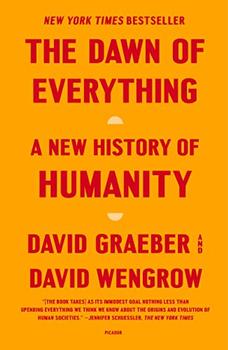Summary | Excerpt | Reviews | Beyond the Book | Readalikes | Genres & Themes | Author Bio

Critics' Opinion:
Readers' Opinion:
First Published:
Nov 2021, 704 pages
Paperback:
Apr 2023, 704 pages
 Book Reviewed by:
Book Reviewed by:
Grace Graham-Taylor
Buy This Book
1
Farewell to Humanity's Childhood
Or, why this is not a book about the origins of inequality
'This mood makes itself felt everywhere, politically, socially, and philosophically. We are living in what the Greeks called the Kairos – the right time – for a "metamorphosis of the gods," i.e. of the fundamental principles and symbols.'
C. G. Jung, The Undiscovered Self (1958)
Most of human history is irreparably lost to us. Our species, Homo sapiens, has existed for at least 200,000 years, but for most of that time we have next to no idea what was happening. In northern Spain, for instance, at the cave of Altamira, paintings and engravings were created over a period of at least 10,000 years, between around 25,000 and 15,000 BC. Presumably, a lot of dramatic events occurred during this period. We have no way of knowing what most of them were.
This is of little consequence to most people, since most people rarely think about the broad sweep of human history anyway. They don't have much reason to. Insofar as the question comes up at all, it's usually when reflecting on why the world seems to be in such a mess and why human beings so often treat each other badly – the reasons for war, greed, exploitation, systematic indifference to others' suffering. Were we always like that, or did something, at some point, go terribly wrong?
It is basically a theological debate. Essentially the question is: are humans innately good or innately evil? But if you think about it, the question, framed in these terms, makes very little sense. 'Good' and 'evil' are purely human concepts. It would never occur to anyone to argue about whether a fish, or a tree, were good or evil, because 'good' and 'evil' are concepts humans made up in order to compare ourselves with one another. It follows that arguing about whether humans are fundamentally good or evil makes about as much sense as arguing about whether humans are fundamentally fat or thin.
Nonetheless, on those occasions when people do reflect on the lessons of prehistory, they almost invariably come back to questions of this kind. We are all familiar with the Christian answer: people once lived in a state of innocence, yet were tainted by original sin. We desired to be godlike and have been punished for it; now we live in a fallen state while hoping for future redemption. Today, the popular version of this story is typically some updated variation on Jean-Jacques Rousseau's Discourse on the Origin and the Foundation of Inequality Among Mankind, which he wrote in 1754. Once upon a time, the story goes, we were hunter-gatherers, living in a prolonged state of childlike innocence, in tiny bands. These bands were egalitarian; they could be for the very reason that they were so small. It was only after the 'Agricultural Revolution', and then still more the rise of cities, that this happy condition came to an end, ushering in 'civilization' and 'the state' – which also meant the appearance of written literature, science and philosophy, but at the same time, almost everything bad in human life: patriarchy, standing armies, mass executions and annoying bureaucrats demanding that we spend much of our lives filling in forms.
Of course, this is a very crude simplification, but it really does seem to be the foundational story that rises to the surface whenever anyone, from industrial psychologists to revolutionary theorists, says something like 'but of course human beings spent most of their evolutionary history living in groups of ten or twenty people,' or 'agriculture was perhaps humanity's worst mistake.' And as we'll see, many popular writers make the argument quite explicitly. The problem is that anyone seeking an alternative to this rather depressing view of history will quickly find that the only one on offer is actually even worse: if not Rousseau, then Thomas Hobbes.
Excerpted from The Dawn of Everything by David Graeber and David Wengrow. Copyright © 2021 by David Graeber and David Wengrow. Excerpted by permission of Farrar, Straus & Giroux. All rights reserved. No part of this excerpt may be reproduced or reprinted without permission in writing from the publisher.





The Flower Sisters
by Michelle Collins Anderson
From the new Fannie Flagg of the Ozarks, a richly-woven story of family, forgiveness, and reinvention.

The House on Biscayne Bay
by Chanel Cleeton
As death stalks a gothic mansion in Miami, the lives of two women intertwine as the past and present collide.

The Funeral Cryer by Wenyan Lu
Debut novelist Wenyan Lu brings us this witty yet profound story about one woman's midlife reawakening in contemporary rural China.
Your guide toexceptional books
BookBrowse seeks out and recommends the best in contemporary fiction and nonfiction—books that not only engage and entertain but also deepen our understanding of ourselves and the world around us.